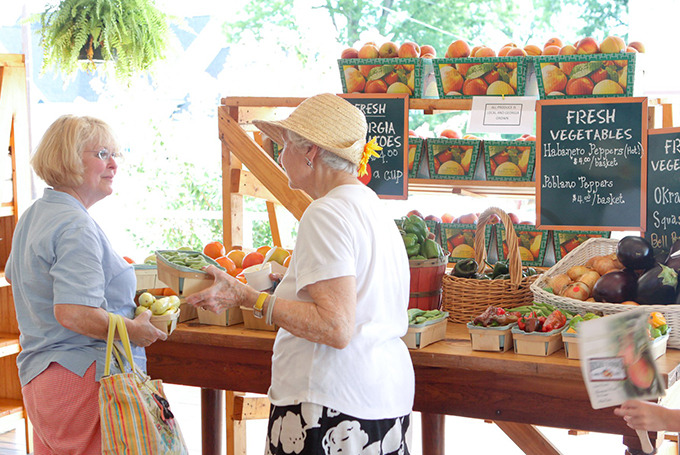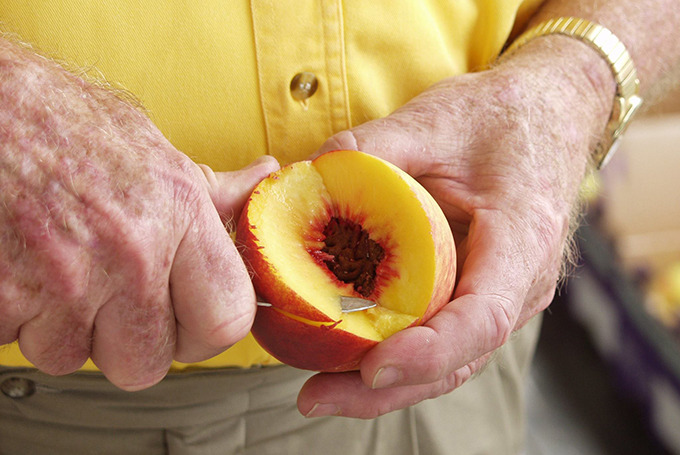Georgia Peach Farm Stand Guide
Here in Georgia, salvation can come in plenty of forms, the sweetest including wooden signs planted along the road:
GEORGIA PEACHES! FRESH TOMATOES, SQUASH, CORDELE MELON in 1 MILE!
Minutes elapse and it emerges: an oasis amid Georgia's thick, swampy climes, and a reminder that the state's greatest gift to the world is the ground itself. Yes, this place gets sticky and messy. But when it does, at least it's peach season.
RELATED Here's How to Quickly Ripen a Peach "
A vision of all things Georgian summer, the roadside farm stand offers its own kind of bounty. Those willing to pull over are rewarded with vinegar-laden boiled peanuts, tomatoes that taste like Southern sunlight and perfectly complement Wonder Bread slathered with Duke's Mayo, and, of course, Georgia peaches so juicy they're best eaten over the kitchen sink.
The law of the roadside stand, however, is buyer beware. Southern charm can be deceptive (that's why it's our greatest weapon), and some drive-by stands are more concerned with making a quick buck. Now, the only surefire way to determine a roadside stand's intentions is to pay it a visit, but these tips will help simplify your produce haul.
 Photo: Dickey Farm/Facebook
Photo: Dickey Farm/Facebook
Quality Oftentimes Depends on Location
Good stands curate good products, plain and simple. While a typical grocery store may rely on variety and quantity to lure customers, roadside stands, which may sell just one or two items, must swear by quality.
By that very virtue, one of the roadside produce stand's strongest factors is the road itself. Stands planted at major exits or intersections get more first-time traffic, so they may not focus on the best possible product or experience, Lee Dickey, co-owner of Dickey Farms in Musella, Georgia, says.
Stands on rural highways, however, depend on repeat sales. So they'll work harder to catch your attention or remain memorable, whether that's through unforgettably delicious produce or misspelled words (e.g., "paeches" or "peeches") painted on wooden signs, which signals a superior product according to an unwritten rural law.
Photo: Dickey Farm/Facebook
Don't Be Shy to Strike Up a Conversation
The more vendors who know about their produce, the better. To test a merchant's knowledge, ask about where the peaches or tomatoes came from—some smaller stands even grow their own goods out back. Listen for details on the land or farmers. Another telling clue? Produce stands associated with the Georgia Farm Bureau or agricultural associations, such as Georgia Grown Trails, are interconnected with the state's best farms and artisans, Dickey says.
Photo: Dickey Farm/Facebook
Know the Signs of Ripeness
The produce stand's goal is selling fresher goods than the those at the store. A perfect peach is malleable when grasped, and the interior flesh's aroma may permeate the skin. Ripe red tomatoes are plump and firm. Shaking a melon, for example, isn't a proper gauge for ripeness. Melons are ready when they reveal creamy yellow underbellies and brown, dry stumps where the fruit was cut from the vine.
Bulk buyers should keep a timeline in mind and estimate the household consumption rate before making any purchases. A family of five, for instance, can down a small bag of nearly ripe peaches faster than two roommates, who should opt for firmer fruit.


